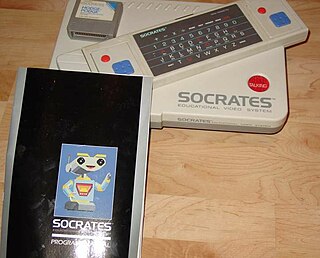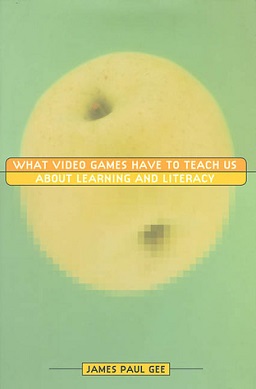Multimedia is a form of communication that uses a combination of different content forms such as text, audio, images, animations, or video into a single interactive presentation, in contrast to traditional mass media, such as printed material or audio recordings, which features little to no interaction between users. Popular examples of multimedia include video podcasts, audio slideshows and animated videos. Multimedia also contains the principles and application of effective interactive communication such as the building blocks of software, hardware, and other technologies.

Learning is the process of acquiring new understanding, knowledge, behaviors, skills, values, attitudes, and preferences. The ability to learn is possessed by humans, animals, and some machines; there is also evidence for some kind of learning in certain plants. Some learning is immediate, induced by a single event, but much skill and knowledge accumulate from repeated experiences. The changes induced by learning often last a lifetime, and it is hard to distinguish learned material that seems to be "lost" from that which cannot be retrieved.
JumpStart is an educational media franchise for children, consisting mostly of educational games, produced by JumpStart Games. The series originally consisted of a series of educational PC games but has since expanded to include workbooks, direct-to-video films, mobile apps, and other media, including a massive multiplayer online game located at JumpStart.com, that were launched on March 10, 2009.
Educational games are games explicitly designed with educational purposes, or which have incidental or secondary educational value. All types of games may be used in an educational environment, however educational games are games that are designed to help people learn about certain subjects, expand concepts, reinforce development, understand a historical event or culture, or assist them in learning a skill as they play. Game types include board, card, and video games.
Situated learning is a theory that explains an individual's acquisition of professional skills and includes research on apprenticeship into how legitimate peripheral participation leads to membership in a community of practice. Situated learning "takes as its focus the relationship between learning and the social situation in which it occurs".
editing technology is the use of technology tools in general content areas in education in order to allow students to apply computer and technology skills to learning and problem-solving. Generally speaking, the curriculum drives the use of technology and not vice versa. Technology integration is defined as the use of technology to enhance and support the educational environment. Technology integration in the classroom can also support classroom instruction by creating opportunities for students to complete assignments on the computer rather than with normal pencil and paper. In a larger sense, technology integration can also refer to the use of an integration platform and APIs in the management of a school, to integrate disparate SaaS applications, databases, and programs used by an educational institution so that their data can be shared in real-time across all systems on campus, thus supporting students' education by improving data quality and access for faculty and staff.
"Curriculum integration with the use of technology involves the infusion of technology as a tool to enhance the learning in a content area or multidisciplinary setting... Effective integration of technology is achieved when students are able to select technology tools to help them obtain information in a timely manner, analyze and synthesize the information, and present it professionally to an authentic audience. The technology should become an integral part of how the classroom functions—as accessible as all other classroom tools. The focus in each lesson or unit is the curriculum outcome, not the technology."
Scientific misconceptions are commonly held beliefs about science that have no basis in actual scientific fact. Scientific misconceptions can also refer to preconceived notions based on religious and/or cultural influences. Many scientific misconceptions occur because of faulty teaching styles and the sometimes distancing nature of true scientific texts. Because students' prior knowledge and misconceptions are important factors for learning science, science teachers should be able to identify and address these conceptions.

An educational video game is a video game that provides learning or training value to the player. Edutainment describes an intentional merger of video games and educational software into a single product. In the narrower sense used here, the term describes educational software which is primarily about entertainment, but tends to educate as well and sells itself partly under the educational umbrella. Normally software of this kind is not structured towards school curricula and does not involve educational advisors.
A serious game or applied game is a game designed for a primary purpose other than pure entertainment. The "serious" adjective is generally prepended to refer to video games used by industries like defense, education, scientific exploration, health care, emergency management, city planning, engineering, politics and art. Serious games are a subgenre of serious storytelling, where storytelling is applied "outside the context of entertainment, where the narration progresses as a sequence of patterns impressive in quality ... and is part of a thoughtful progress". The idea shares aspects with simulation generally, including flight simulation and medical simulation, but explicitly emphasizes the added pedagogical value of fun and competition.
Filament Games is an American educational video game developer based in Madison, Wisconsin and founded in 2005 by partners Daniel White, Daniel Norton, and Alexander Stone. They are a design and production studio specializing in the creation of authentic gameplay mechanics that are also accurate representations of educational content. By actively embedding learning objectives within game activities, Filament's games help players transform their play experience into real world knowledge.
Augmented learning is an on-demand learning technique where the environment adapts to the learner. By providing remediation on-demand, learners can gain greater understanding of a topic while stimulating discovery and learning.
iKen.in is an interactive knowledge sharing & social networking site, built on a collaborative learning model. The website is built keeping in mind the specific needs & dynamics involved in a learning process. Its participatory learning model helps users to share content and connect with peers. Apart from User Generated Content, UGC, users can also learn by taking tests available on the website which are customized for each standard (grade) in the K-12 segment. Also, Iken.in has a play section that features educational interactive games.

Genomics Digital Lab (GDL) is a browser-based series of educational games, simulations, and animations created by Spongelab Interactive. It is designed to teach high school students about biology including photosynthesis, respiration, transcription, and translation. Genomics Digital Lab was released in 2009 and is available for purchase at home or school, or as a free 7-day trial.

History of Biology is a simple browser-based scavenger hunt-style educational game that was created by Spongelab Interactive. It is designed to teach high school students and general interest groups about the history of biology.

David Williamson Shaffer is the Vilas Distinguished Achievement Professor of Learning Science at the University of Wisconsin–Madison in the department of Educational Psychology, the Obel Foundation Professor of Learning Analytics at Aalborg University in Copenhagen, a Data Philosopher at the Wisconsin Center for Education Research, and Principal of EFGames, LLC.
Mobile computer-supported collaborative learning may have different meanings depending on the context in which it is applied. Mobile CSCL includes any in-class and out-of-class use of handheld mobile devices such as cell phones, smart phones, and personal digital assistants (PDAs) to enable collaborative learning.

What Video Games Have to Teach Us About Learning and Literacy is a book by James Paul Gee that focuses on the learning principles in video games and how these principles can be applied to the K-12 classroom. Video games can be used as tools to challenge players, when they are successful. They motivate players to persevere and simultaneously teach players how to play the game. These games give a glimpse into how one might create new and more powerful ways to learn in schools, communities, and workplaces. Gee began his work in video games by identifying thirty-six learning principles that are present in—but not exclusive to—the design of good video games. He further argues for the application of these principles into the classroom environment. What Video Games Teach Us about Learning and Literacy is a call to educators, teachers, parents and administrators to change the approach to pedagogy.

Kahoot! is a Norwegian game-based learning platform, used as educational technology. It has learning games, also known as "kahoots", are user-generated multiple-choice quizzes that can be accessed via a web browser or the Kahoot! app. Kahoot! also includes trivia quizzes. This educational platform is similar to other technological learning tools such as Wooflash, Blooket, Quizziz, Gimkit, or Quizlet.
Games and learning is a field of education research that studies what is learned by playing video games, and how the design principles, data and communities of video game play can be used to develop new learning environments. Video games create new social and cultural worlds – worlds that help people learn by integrating thinking, social interaction, and technology, all in service of doing things they care about. Computers and other technologies have already changed the way students learn. Integrating games into education has the potential to create new and more powerful ways to learn in schools, communities and workplaces. Games and learning researchers study how the social and collaborative aspects of video game play can create new kinds of learning communities. Researchers also study how the data generated by game play can be used to design the next generation of learning assessments.
Alan Amory is a professor of educational technologies at the University of Johannesburg, where he promotes and drives the use of educational technologies. He has contributed to numerous fields of research, including information and communication technologies in education, video games and learning, tool-mediated knowledge construction, authentic learning, and Cultural Historical Activity Theory (CHAT).







